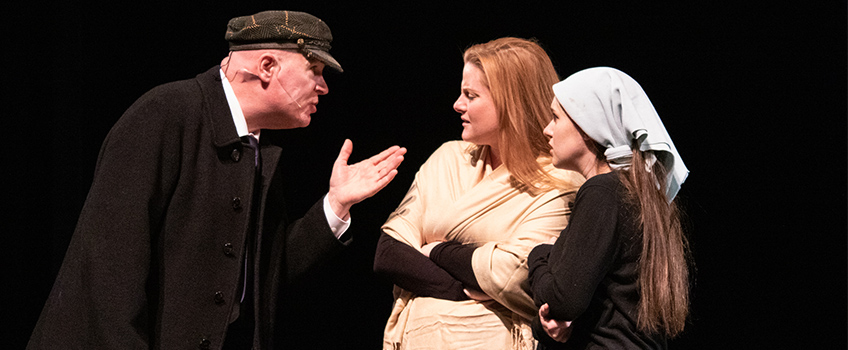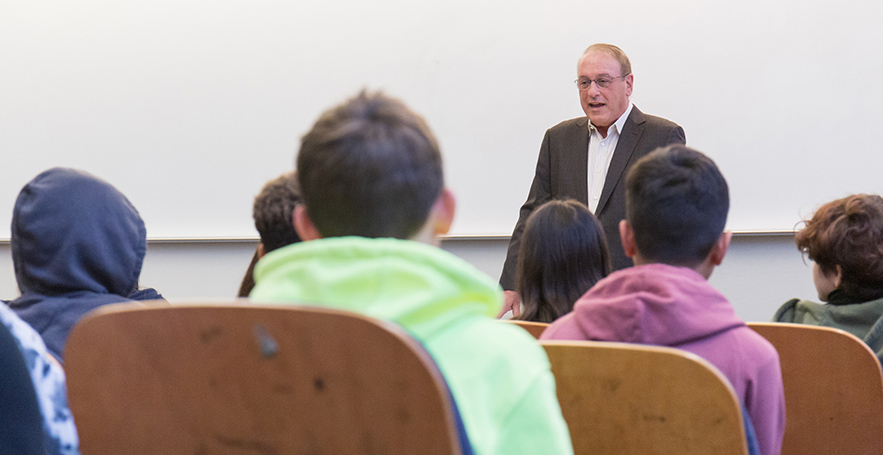Play Brings Holocaust Story to Local Students

The play 'Dear Esther' tells the story of Holocaust survivor Esther Raab who escape from the Nazi death camp Sobibor in Poland.
Galloway, N.J. — The first words of the Holocaust play “Dear Esther” are some of the most horrible epithets in the English language.
“We are going to teach you that what you hear as a child, you may repeat as an adult and how horrible and evil that can become,” said the play’s narrator.
He then joined two other actors to recite a series of the worst racist and antisemitic names you can think of.
It was a jarring way to begin two performances of the play on March 7 and 8 at the Stockton University Performing Arts Center, especially when the audience was nearly 1,000 middle and high school students over two days.
But for Marvin Raab, the son of the play’s namesake Esther Raab, the corrosive effect of hate is the most important message for schoolchildren to hear.
“Hatred is always going to be there. The world is filled with that concept,” Marvin Raab said. “But the key is if it’s not (hatred against) the Jews, it’s somebody else. This play is not just for Jews, it’s for all mankind. So it’s important that we educate the students, then when they grow up they will have a different outlook on life.”

Marvin Raab, the son of Esther Raab, speaks to a group of students from Belhaven Middle School after the students watched the play 'Dear Esther.' The play is the story of Esther's life and eventual escape from the Nazi death camp Sobibor.
Marvin Raab spoke on March 8 to groups of students and answered questions about “Dear Esther” and his mother’s amazing story of resistance and survival. The performances were part of the PAC’s educational outreach series called Imagination Station and was put together in collaboration with Stockton’s Sara and Sam Schoffer Holocaust Resource Center.
Esther Rabb’s story has been told many times, both in the book “Escape from Sobibor” by Richard Rashke and later a TV movie of the same name, about a successful escape by 300 Jews at a Nazi death camp in Poland. After the TV movie version aired on CBS in 1987, Marvin Raab said his mother, who lived in Vineland, received several inquiries from local schools to speak to students. Through those talks, she received hundreds of letters from students of all ages asking to be pen pals and inquiring about her life and her experiences living through the Holocaust.
“All those questions that you wouldn’t ask as an adult, these students would ask,” Marvin Raab said.
Esther collected close to 800 letters and suggested to Rashke that he write a play telling her story but integrating the letters she received from students. In the play, an older Esther has a conversation with a younger version of herself as she reveals the atrocities she faced while in Sobibor and her eventual escape.
“It’s an avenue for students to really understand what happened during that time,” Marvin said. “My mother tells them what happened, but on their level.”
I think that it’s really the story of the immense bravery that some people had to not only survive these terrible conditions and this terrible piece of our history, but to tell the world about it in hopes that it can never happen again."
“There really are no words to describe how impactful this play was,” said the Egg Harbor City resident. “I think that it’s really the story of the immense bravery that some people had to not only survive these terrible conditions and this terrible piece of our history, but to tell the world about it in hopes that it can never happen again.”
In addition to putting on productions of the play all over the world, Marvin Raab said he has been working with Stockton’s Holocaust Resource Center to put “Dear Esther” into a book to be offered for free to schools. That way schools can act out the play on their own or read the words in class. The center also offers a guide for teachers.
Cedar Creek High School’s Tim Watson teaches a Stockton dual-credit class called Conscience of Mankind, which focuses on the Holocaust and other Genocide Studies.
“I think the power of storytelling is great for the students to hear, and Esther Raab’s story is an incredible one,” he said. “It’s important to expose students to this, especially today. We see things, whether it’s here in the United States or what’s happening Ukraine right now. It’s important for our students to have a bigger awareness of how you get to some of the really bad things that have happened through history.”
And one of the primary messages of “Dear Esther” is that it can start simple, with just some name calling, perhaps on social media. Students need to understand, Marvin Raab said, that when you look at somebody different and you make a joke about them, it can quickly escalate to something as horrible as murder, simply because they are different.
“Hatred is all around us,” he told a group of students from Belhaven Middle School in Linwood. “I don’t want you to think that it’s only in some distant place in a distant country. It’s around us and you need to be aware of it.”
— Story by Mark Melhorn, photos by Bernard DeLury
# # #
Media contacts:
Stacey Clapp
Director of Strategic Communications
Stacey.Clapp@stockton.edu
609-626-3645
609-412-8069
stockton.edu/media
Mark Melhorn
Associate Director of News and Media Relations
Mark.Melhorn@stockton.edu
609-652-4593
609-569-6026
stockton.edu/media


